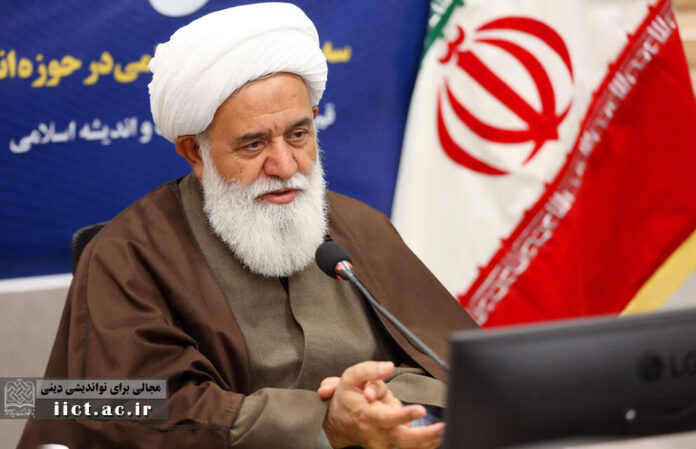According to the Public Relations Office of the Research Institute for Islamic Culture and Thought, in recognition of three decades of scholarly effort in the field of Islamic political thought, the conference “Performance Report of the Politics Group” was held on Wednesday, December 11, 2024.
The event was organized by the Politics Group of the Institute in collaboration with the Institute of Political Science and Thought of the Islamic Sciences and Culture Research Institute, the Seminary and University Research Institute, the Arbaeen Cultural Committee (Abarat), and the Seminary’s Association of Political Studies, both in-person and virtually.
Ayatollah Ali Akbar Rashad, speaking at the conference, stated: “When the Research Institute for Islamic Culture and Thought was founded, one of the ideas that came to mind was to work in underexplored areas. My perspective was not to address every abandoned or promising topic we thought we could handle. In this regard, one of the neglected fields was Islamic political thought, and the formation of the Politics Group was essentially a step in this direction.”
The Literature and Content Produced by the Politics Group Have Been Influential Nationwide
The Head of the Research Institute for Islamic Culture and Thought continued: “At the time, many other institutions, including the Assembly of Experts, were working on this subject. I reviewed their research but realized they were operating in entirely different realms. Thus, the groundwork at the Research Institute was laid, and a successful and productive body emerged. Its blessings were not only theoretical but also practical. The group’s achievements are not limited to written products; rather, the literature and ideas generated by the Institute have had a greater impact on the country than what is documented on paper. We have influenced the intellectual ecosystem of the country, even if it is not always attributed to us. In various fields—practical and theoretical—we have been effective, although these contributions often don’t appear in reports.”
The Research Institute Has No Rival in Producing Philosophical Disciplines in the Country
He added: “The Research Institute for Islamic Culture and Thought holds a special status not only in Iran but also on a global scale. In producing applied philosophies and philosophical disciplines, we have no rival in the country. Once, during a discussion with Professor Legenhausen, a prominent international philosopher well-versed in Western philosophical schools, I mentioned that the Research Institute has worked on over 70 applied philosophies. After hearing this, he was momentarily astonished and then remarked, ‘This is a revolution in philosophy.’ He understood the magnitude of the work we had accomplished.”
Ayatollah Rashad stated: “In training human resources, we have been notably successful, as acknowledged by our peers. Today, more than half of the Institute’s members are among the country’s prominent scholars. Considering the number of members, we have produced a significant amount of academic output and nurtured outstanding scholars, particularly when compared to major universities like the University of Tehran and Allamah Tabataba’i University. I believe that within the next 7 to 10 years, all of the Institute’s faculty members will achieve the rank of full professor. This is a significant achievement for the country: a small institution, with far fewer resources than other organizations, has been able to reach such an academic level.”
In another part of his speech, he noted: “One of the significant contributions of the Research Institute for Islamic Culture and Thought is the training of distinguished scholars. The Politics Group is one of the Institute’s thriving groups with an impressive record in this regard. Its activities are widely recognized. I personally focus on political jurisprudence, and I am currently teaching a course on Fiqh al-Wilayah.”
Fiqh al-Muqawamah (Jurisprudence of Resistance) Is a Field That Requires Serious Research
Ayatollah Rashad concluded: “During my research, I realized that apart from one case—where the late Ayatollah Asefi addressed the subject in a few small booklets—there is no other work on Fiqh al-Muqawamah. This is despite the fact that the issue of resistance is a critical matter that the Islamic world is currently grappling with. However, no significant academic effort has been made in this area, and it is imperative that we undertake research on it.”




